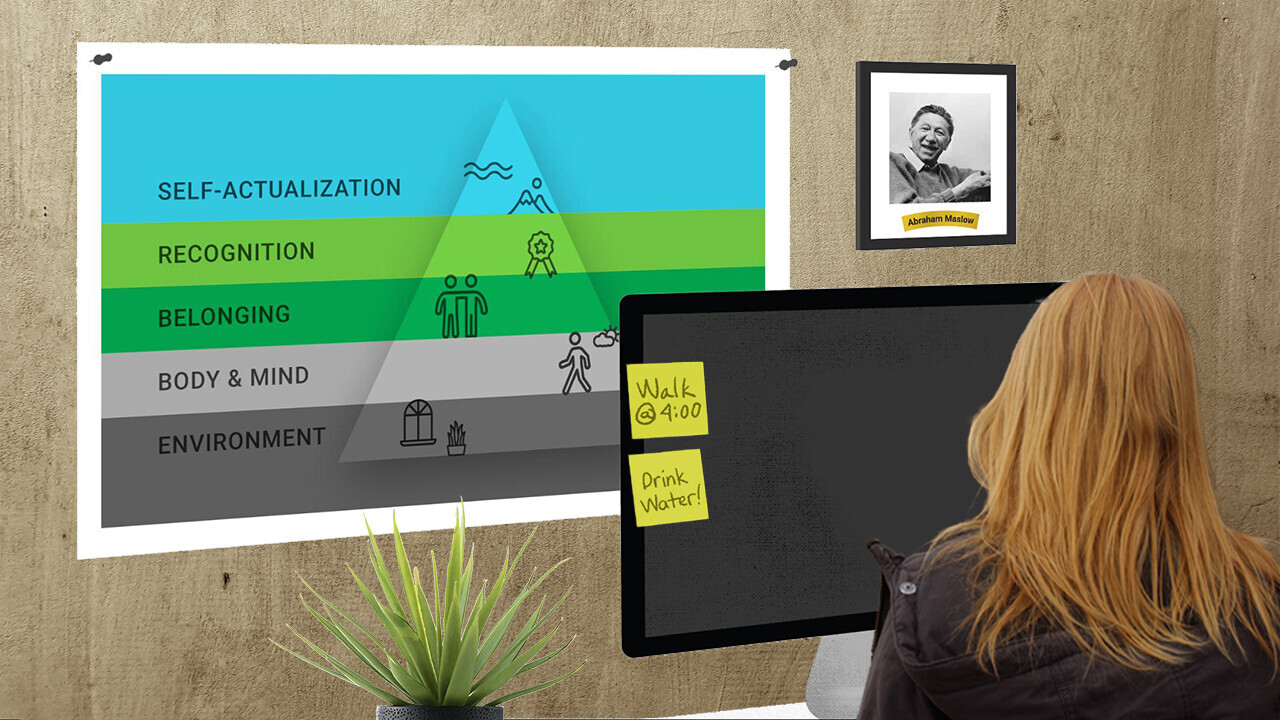
I’ve found remote life is the work version of living alone. You’re spared the surprises, good or bad, that come with sharing your space every day. You’ve got the freedom to experiment and change things on the fly, and you don’t need to ask for permission. You’re the one in charge of how your day goes: You can monitor your energy levels, control the snacks, set the thermostat, go outside if you want. Along with this freedom comes great responsibility: you can do whatever you want, but the downside is… you get to do whatever you want.
I’ve been working remotely for three years now, with another four years spent working in-office for a remote-friendly company, and I’ve seen a lot of good (and bad) advice about how to thrive. A lot of folks are tempted to make declarative advice, or to assign a particular positive or negative value to various choices, e.g. “don’t have snacks on hand, because you’ll eat them” — but I love snacks, and work best when I have them available.
Remote work is an art and a science: Part introspection (what do I think will work well for me?), and part experimentation (now that I’ve tried this, what actually works well for me?).
The best we can do is help one another discover and try out different options. In that spirit, here are a few key spheres I’ve learned to consider as I iterate on my own remote work life:
1. Spend time finding the best work environment for you
First and foremost: Where are you planning on spending your workday? Your environment has an enormous effect on how you feel and what you can accomplish, so it’s worth taking the time to be thoughtful about this fundamental piece of the remote puzzle. What kind of environment helps you do your best work?
If you’re used to working in an office, you might not have had much opportunity to play with this piece before! Do you want the stability of working in the same place every day, or does the novelty of moving around keep you inspired? Are you a sunflower, seeking the most natural light possible, or would you live in a cave if you could? How do you treat your body during the day: Do you prefer a standing desk, seated desk, yoga balls, the floor, a deck chair, all of the above?
[Read: How coworking spaces need to evolve after the WeWork disaster]
Lots of folks who work remotely work from home: Consider whether this is right for you, part-time or full-time. Maybe it’s great for one kind of work (taking team meetings via videoconference) but not others (creative work, coding, heads-down focus time). Will the freedom to put in a load of laundry during your lunch make your life easier, or will you be distracted by all the possible chores in your house?
You might not guess all the right answers right off the bat; they might even change over time. Be curious, and be open to change: Doing good work requires you to have a strong foundation, and your physical space is a crucial piece of the puzzle.
I worked from a basement for my first year working remotely. It was fine, and then it wasn’t. I worked from home, from a room with an above-ground window, for the next year. It was great, and then it felt isolating. I eventually ended up moving to a shared work/social space for a year, and then a more traditional coworking space. I love the freedom to work from home, but I also appreciate a little coffee shop time, plus the familiar faces at my coworking space.
2. Take care of your body and mind
You need to be able to think clearly if you’re going to do good work, and a big part of mental health is physical health. If you’re not meeting the basics, like sleep and food, you won’t be able to show up mentally in a way that allows you to do your best work.
The good news is that most of these factors are simple (which is not to say they’re easy), and they’re things you have the ability to change independently (and for cheaper than a coworking desk).
Some ideas to consider:
- Are you drinking enough water?
- Are you eating in a way that works for you?
- Are you getting enough sleep, and at consistent times?
- Are you getting some kind of physical activity, whatever that means for you?
- Do you get a little outside time during the day, especially in the morning?

3. Friends and coworkers, belonging and love
We all need some connection in our lives, but there’s no one-size-fits-all solution in this department. An office provides built-in human connection every day; remote folks will need to fine-tune this balance for ourselves. On the bright side, this gives you a lot of freedom, flexibility, and control.
However, if you’ve fallen into the trap of only socializing with coworkers before, that’s probably no longer an option. As a remote worker, you will almost definitely need to be more proactive to outfit your life with the right amount of socialization for you.
Social things won’t happen by accident, while no one will pressure you to come out to happy hour, you also won’t encounter their surprise birthday cake in the kitchen. But this can be a fruitful opportunity to set up long-term systems that will outlast your current remote role and situation.
As a remote worker, you have the opportunity, and the responsibility, to make active choices about what you do and who you see. Otherwise, your video conference colleagues/desk neighbors/barista may be the only people you ever talk to, or who know how your cat is doing (even if those people are truly lovely and very invested in cat well-being).
Maybe there’s a rec league sports team you’d like to join, or a thinly veiled excuse to gather friends regularly. One friend of mine held weekly evening “office hours” where he’d offer bad advice and good hugs; another bemoaned her lack of women friends, so started inviting the cool women she knew to get together and bring their friends.
4. Be honest about the recognition you need
Many organizations now realize that money in exchange for work is not all that people need to feel fulfilled. Recognition by others for the care and quality you put into the work you do every day has a huge impact on feelings of job satisfaction and fulfillment. Recognition, to me, is the glue between relationships and self-actualization.
Working in the same physical space as your colleagues provides ample opportunities for high fives, ad-hoc shoutouts, and that wonderful feeling you get when you overhear folks in the kitchen talking about how great you are. But being a remote worker sometimes means you miss out on casual positive feedback or positive body language.
Some managers will be proactive to find out what you need to feel recognized and appreciated. If you have a manager like this, great! If not, you may need to take a more active role in getting the recognition you need and deserve.
Do some thinking: How do you like to be recognized? Recognition can be public (verbal praise at a team or company meeting), or private (during a 1:1), and one of these might feel better to you. Whatever your preference, ask for what you need up front.
Don’t have secret desires; even well-intentioned managers can’t read your mind. You may want to practice with a friend if you’re not accustomed to making direct requests like this. It may be uncomfortable at first, but will be well worth it for the increase in job satisfaction you’ll get by being recognized in a way that feels good to you.
5. Self-actualization
I think everyone would agree with me when I say that part of the dream of remote work is the flexibility it offers. And what is flexibility for, if not to live your dream life? You probably have lots of dreams that you’ve always said you’d make real if you had the time or the flexibility, and many of them are probably now more feasible than you realize.
Working remotely gives you myriad options for how to accomplish the things you need to do: How do you define home? What does freedom mean to you? What are you trying to accomplish in your life beyond the scope of your job?
These are audacious questions — the big philosophical questions of life. And I’ve found working in a remote role gives you the freedom, flexibility, and agency to get the things done that are important to you.
Yes, the sheer amount of possibility can feel intimidating, but it’s worth regularly checking in with yourself to ensure you’re making choices about your life that will help you feel fulfilled, not just doing what’s right in front of you.
Consider this definitely-not-exhaustive list when building your ideal remote work life:
- How much flexibility and change do you desire? Do you prefer moving around often or finding your one perfect place?
- Do you have a hobby you want to build a life around? Does being in a certain location (by the beach) or keeping a certain schedule (nocturnal vs diurnal) support your extracurricular pursuits?
- Do you enjoy the flexibility to travel, without limiting yourself to how many vacation days you have?
- Is there a community (religious/cultural/fitness/lifestyle) you are involved with that is important to your happiness and health?
Remote work can be a key part of a fulfilling, adaptable lifestyle, but like any complex system, a lot can go into optimizing it. Picking options that sound reasonable is a great place to start, and regularly checking in with yourself can help you discover whether those are still the best choices for you. What continues to make “remote” one of my favorite work environments has changed over time.
I used to love having our house to myself (or spending all day in a coffee shop), regularly decorating my desk, and making lunch at home. Now, I love my coworking space (with its big windows and kind people), having a commute that I designed for myself, a standing desk in the corner of our dining room (with our toddler’s table underneath), and being able to adjust my day and my environment whenever I need to.
Staying curious, being willing to be wrong, and experimenting help me evolve my approach. My remote life has given me the opportunity to explore and adore my home city more than ever, and every year, I get to learn from my amazing coworkers, too, whether they’re dozens (or thousands) of miles away.
Like what you’ve read? On Growth Quarters, we strive to go beyond generic ‘fortune cookie advice’ and learn directly from the people who have ‘walked the walk.’ And this summer, at TNW Conference 2020 in Amsterdam, we’ll take Growth Quarters offline again with a vibrant program dedicated exclusively to sustainable business growth. Listen to keynotes from leaders from the world’s most successful companies and get actionable guidance to help you grow professionally. Get early bird tickets now and learn more about the Growth Quarters track.
Get the TNW newsletter
Get the most important tech news in your inbox each week.




